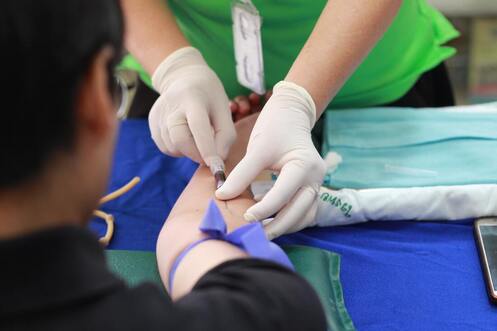 The following blood tests are worth requesting from your family doctor/GP if you have been struggling with...
If your doctor wont order all or some of these tests (sometimes there are public health funding reasons for this), it’s worth investing in having them done via a private lab. It will cost more but then you have a baseline to work from as you work on your health. And as you focus on improving your health, blood tests only need to be repeated once every six to 12 months at most. Vitamin B12
Your nervous system, the home of your thoughts and emotions, requires B12 at all ages and life stages and your nervous system’s myelin sheathing cannot be structurally healthy without adequate B12. B12 is also needed for methylation and making serotonin. B12 deficiency has been found to play a role in cognitive changes, OCD, and postnatal depression. Folate / Vitamin B9 Your nervous system requires folate (vitamin B9) at all ages and life stages. It is needed for a healthy pregnancy, spinal cord health, methylation, and making serotonin and DNA. Folate deficiency has been linked to depression, OCD, and depression during pregnancy. Additionally, if you have struggled to find the right antidepressant medication for you, it’s worth being aware that research indicates having good folate levels may support a favourable response to treatment with antidepressants. Full iron studies Iron is essential for healthy brain development, building neurotransmitters such as serotonin, and normal metabolism of GABA. Additionally, iron is localized in oligodendrocytes, one of the types of cells responsible for myelination. Dozens of brain imaging studies in people with OCD have noted abnormal myelination, so if you have OCD it arguably makes sense to do all you can to support your myelin health. Iron deficiency can occur for many reasons: insufficient dietary intake of iron foods, heavy blood loss to periods, pregnancy, chronic inflammation, depletion caused by medications such as antacid drugs (because gastric acid facilitates iron absorption). And, digestive health conditions that damage gut wall cells (coeliac disease, infections) also impact the body’s ability to absorb iron from foods and supplements. Additionally, internal bleeding (think stomach ulcers, anal fissures) will adversely affect iron stores. Given the importance of iron for healthy brain development and the prevalence of iron deficiency worldwide, it is important to consider the role of iron deficiency in mental health. A recent, fascinating two-year study looked at the link between iron deficiency and mental health problems in 335 outpatients of a psychiatrist. Some key findings of the study were:
Other studies have found a link between iron deficiency and OCD, and postnatal depression. Requesting full iron studies means having your serum iron, ferritin, transferrin, and Total Iron Binding Capacity assessed by the lab. Blood tests that look at your serum iron alone do not give the full picture of your iron status. This is because serum iron relies on the amount of transferrin available for transport (think of transferrin as iron’s taxi that enables it to travel through your blood). Plus, your ferritin is your main store of iron and a good indicator of overall iron stores. Vitamin D Perhaps because we have increasingly been taught to avoid the sun, vitamin D deficiency is becoming increasingly common. Additionally, some genetic variants can reduce your body’s ability to use vitamin D. Vitamin D is essential for neurodevelopment and deficiency in vitamin D has been linked to depression, dementia, OCD, and schizophrenia. Other standard blood tests worth having done are:
The results of these can indicate whether you are eating enough protein; whether you have adequate zinc levels (indicative, not diagnostic); if inflammation is present; whether there is an excess of sugar, alcohol, and carbohydrates being consumed (this has implications for your heart health); the possibility of chronic infection; whether your liver needs support (this has implications for digestive health, your body’s natural detoxification pathways, and thus your overall health). These blood tests also give your nutritionist more information about your iron, folate, and B12 status. How to prepare for your blood tests
Finally, the majority of clients I have worked with who present with a history of OCD, depression, and/or anxiety have presented with (sometimes severe) deficiencies in:
The causes of these deficiencies vary from person to person. As a nutritionist, I help you determine which deficiencies are affecting you and what caused these deficiencies to begin with. Then I help you learn how you can address them at their roots. If you’d like to learn more about how nutrition can support your OCD recovery, check out my ebook - it's the world's first evidence-based guide to Nutrition for Your OCD Recovery. References
0 Comments
Leave a Reply. |